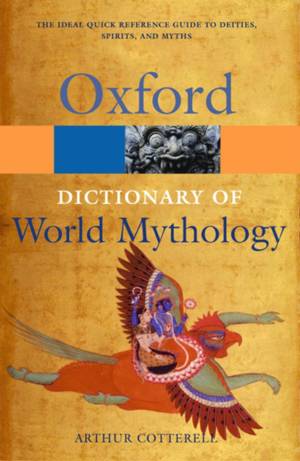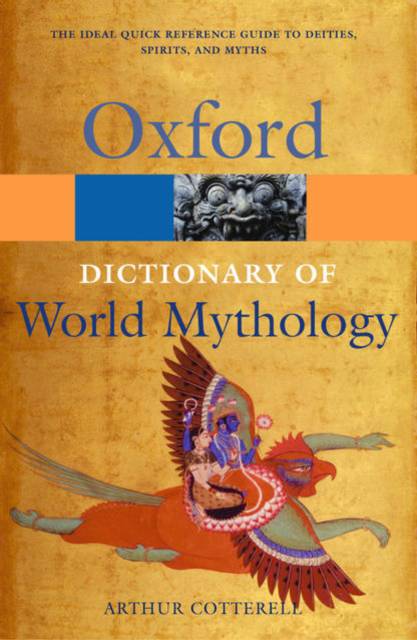
- Retrait gratuit dans votre magasin Club
- 7.000.000 titres dans notre catalogue
- Payer en toute sécurité
- Toujours un magasin près de chez vous
- Retrait gratuit dans votre magasin Club
- 7.000.0000 titres dans notre catalogue
- Payer en toute sécurité
- Toujours un magasin près de chez vous
Description
"I am Nature, the universal Mother, mistress of all the elements, sovereign of all things spiritual....I am worshipped in many aspects, known by countless names, and propitiated with all manner of different rites, yet the whole round earth venerates me." With these words, Isis--the mother goddess of Egypt--reveals herself to her devotee, Lucius Apuleius, in his novel The Golden Ass. Just as this great goddess claimed to be universal, mythology itself exists in all cultures around the globe and extends back to the beginnings of human civilization. Plato first coined the term mythologia to mean merely the telling of stories which contain legendary figures. Since his time, and especially now with the resurgent interest in myths, mythology has come to hold greater significance and power as a crucial element of civilization as a whole.
Written by a leading scholar of ancient civilizations, A Dictionary of World Mythology presents the powerful gods of Greece, Rome, and Scandinavia, the more mystical deities of Buddhist and Hindu India, and the stern spirits of the African and American continents together in one fascinating volume. Drawing upon hundreds of myths from around the globe, Arthur Cotterell not only reveals the vast differences in these civilizations, but also demonstrates the unity of mankind in its fundamental need for explanations of the unknown.
Cotterell divides the chief myths of the world into seven main sections--West Asia, South and Central Asia, East Asia, Europe, America, Africa, and Oceania. Traveling through this vast array of legendary riches, we encounter Gilgamesh, the tyrannical, semi-divine king of Babylonia, who, according to the Gilgamesh Epic, rejected Ishtar and thus caused the ravaging of the earth by Anu, the bull of heaven, and the death of his lifelong friend Enkidu. We learn that Dharma--the term meaning the doctrine of duties and rights of each caste in the Hindu religion's ideal society--was an ancient Hindu sage who married thirteen of Daksha's daughters, and that, according to the Mahabharata, Daksha sprang from the right thumb of Brahma. From East Asian mythology, we discover Tsao Chun, the gentle Chinese kitchen god whose temple exists in a small niche near the cooking stove. Along with the well-known Greek and Roman deities, Europe has also brought us Dagda, the ancient Irish deity of life and death, who could, with one end of his staff, kill nine men and could, with the other end, restore them to life; and Balder, "the bleeding god" of Germanic mythology, renowned for his good looks and wisdom. According to Native American tribes living along the Xingu River in Brazil, a legendary nation called Minata-Karaia once existed with men who had holes in the top of their heads which produced high, loud whistles, and bunches of coconuts growing from their armpits. From Africa, Ogun, the Yoruban war god, descended by a spider's thread upon the marshy waste that existed prior to the formation of the earth. We also meet Papa, the ancestress of Hawaiian people, who functioned as Earth goddess and queen of the underworld, as well as mother of the gods.
Each section contains an introduction highlighting the history, lifestyle, and ideology of the particular ancient civilizations, as well as the landscape in which they lived and the reasons why different mythologies arose in different lands.
Written by a leading scholar of ancient civilizations, A Dictionary of World Mythology presents the powerful gods of Greece, Rome, and Scandinavia, the more mystical deities of Buddhist and Hindu India, and the stern spirits of the African and American continents together in one fascinating volume. Drawing upon hundreds of myths from around the globe, Arthur Cotterell not only reveals the vast differences in these civilizations, but also demonstrates the unity of mankind in its fundamental need for explanations of the unknown.
Cotterell divides the chief myths of the world into seven main sections--West Asia, South and Central Asia, East Asia, Europe, America, Africa, and Oceania. Traveling through this vast array of legendary riches, we encounter Gilgamesh, the tyrannical, semi-divine king of Babylonia, who, according to the Gilgamesh Epic, rejected Ishtar and thus caused the ravaging of the earth by Anu, the bull of heaven, and the death of his lifelong friend Enkidu. We learn that Dharma--the term meaning the doctrine of duties and rights of each caste in the Hindu religion's ideal society--was an ancient Hindu sage who married thirteen of Daksha's daughters, and that, according to the Mahabharata, Daksha sprang from the right thumb of Brahma. From East Asian mythology, we discover Tsao Chun, the gentle Chinese kitchen god whose temple exists in a small niche near the cooking stove. Along with the well-known Greek and Roman deities, Europe has also brought us Dagda, the ancient Irish deity of life and death, who could, with one end of his staff, kill nine men and could, with the other end, restore them to life; and Balder, "the bleeding god" of Germanic mythology, renowned for his good looks and wisdom. According to Native American tribes living along the Xingu River in Brazil, a legendary nation called Minata-Karaia once existed with men who had holes in the top of their heads which produced high, loud whistles, and bunches of coconuts growing from their armpits. From Africa, Ogun, the Yoruban war god, descended by a spider's thread upon the marshy waste that existed prior to the formation of the earth. We also meet Papa, the ancestress of Hawaiian people, who functioned as Earth goddess and queen of the underworld, as well as mother of the gods.
Each section contains an introduction highlighting the history, lifestyle, and ideology of the particular ancient civilizations, as well as the landscape in which they lived and the reasons why different mythologies arose in different lands.
Spécifications
Parties prenantes
- Auteur(s) :
- Editeur:
Contenu
- Nombre de pages :
- 330
- Langue:
- Anglais
- Collection :
Caractéristiques
- EAN:
- 9780192177476
- Date de parution :
- 19-04-90
- Format:
- Livre broché
- Format numérique:
- Trade paperback (VS)
- Dimensions :
- 130 mm x 197 mm
- Poids :
- 267 g

Les avis
Nous publions uniquement les avis qui respectent les conditions requises. Consultez nos conditions pour les avis.






